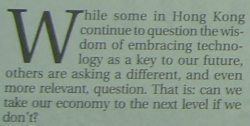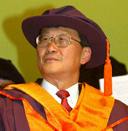


After several days’ festive inattention to this diary, The Great Internet Outage of 2006 prevented me from updating for the last week. Modern technology thwarted by billion-year-old tectonic plates sliding around off Taiwan. They thought they were so clever when they invented fibre-optic cables. “The diameter of a human hair,” they said – but they didn’t think about earthquakes.
Gerald Ford has died. I had forgotten that he hadn’t already. He was solidly at the nonentity end of the scale for presidents, but that doesn’t stop the Wall Street Journal and others eulogising him as if he was a giant of a statesman. Then again – by today’s standards... Also passing away recently was Jeanne Kirkpatrick, acerbic former US Ambassador to the United Nations. She distinguished between ‘authoritarian’ neo-fascist regimes like Argentina whom she believed the US should back and ‘dictatorial’ ones, otherwise known as commies. This put her in an embarrassing position when the UK and Argentina went to war over the Falklands, but she was eased into toeing the US line by a Latino anti-Thatcher fellow delegate – from Peru, if I recall – who said the war was due to “women’s hormones,” a remark that led her to storm out of the Assembly. Her husband, who taught me for a while, was mild and meek.
Saddam Hussein has been hanged. Amnesty International, who are apparently unaware of his background, is upset. What do they propose doing with such a person? Strap an electronic tag round his ankle, give him a community service order and send him to counselling? I suppose I am agnostic about capital punishment. If it had a deterrent effect, I could see a point to it, but I have never seen any evidence that it has. Its main purpose seems to be to give tyrannical governments in barbaric and primitive places like Mainland China, Saudi Arabia and Singapore a tool with which to cow their citizens into unquestioning obedience and submission. Its secondary purpose is to give state governors in the US a last-ditch weapon during elections – “I will sign more death warrants than my opponent.” And it disposes of people like Saddam.
My mind experiences a flashback from 10 years ago. The man waiting to be the first Chief Executive of Hong Kong Special Administrative Region, Tung Chee-hwa, was asked by a foreign reporter whether he would restore the death penalty in the Big Lychee after the handover. The genial crop-haired one replied that he would not. After a pause, he elaborated. “I was advised by someone whose opinion I greatly trust,” he explained (or words to that effect). While few seriously expected or wanted the hangman to return, they would have appreciated a less insipid line of reasoning. It was one of those early-warning signs that a Great Cluelessness was about to descend on our city.

Asia, whose century this was supposed to be, is crumbling before our eyes. In Indonesia, a 737-400 has vanished somewhere around Sulawesi, frequent winner of Most Interestingly Shaped Island Of The Year Award. At first the authorities said they didn’t know where the aircraft went down. Then they said the wreckage had been spotted in some patch of jungle. Then they said there were a dozen survivors. Now they admit that those last two statements were totally false – maybe it crashed at sea. That charming Southeast Asian habit of telling people what they want to hear tends to backfire at times.
Eight bombs exploded on New Year’s Eve in Bangkok, killing three and injuring several dozen, including tourists. Common sense tells us it’s the work of Islamist militants from the Thai south. But the junta that ejected the democratically elected, if slightly whacky, Thaksin government last September seems to insist it is the doing of loyalists of the old regime. But that doesn’t ring true – they weren’t that wacky. So could it be members of the junta itself, looking for excuses to keep themselves in power? After all, this is the same group of incompetents who, just a couple of weeks back, sent the stock market into a dive by imposing and then withdrawing absurd controls aimed at preventing the currency from rising, leaving the central bank looking so stupid that foreign investors dropped the Baht and… the currency stopped rising.
Thurs, 4 Dec
As of 1 January, it has been illegal in Hong Kong to smoke in clubs, bars, karaoke dens, restaurants, public parks and a variety of other facilities. And yesterday it was my pleasure to behold the enforcement of this new law for the first time on that miracle of urban transport infrastructure, the Mid-Levels Escalator. Obviously, none of the neighbourhood’s industrious, taxpaying, disenfranchised, middle-class residents would smoke in a public place, if at all, and nor would the clean-living, mainly older and poorer, traditional inhabitants further down the hill in the area now known as Soho.
However a transformation is taking place in the latter district. Its decade-long gentrification has shifted up a gear, and rich young gwailos and westernized locals are clamouring for apartments there. The families that are the longstanding owner-occupiers of the poky flats in 40-year-old six-storey walk-ups typically live on maybe HK$10,000 a month at the most. The father does maintenance work in a seedy old shopping mall, while the mother drives a school bus or cleans offices. Granny stays at home and the kids go to school. Then they learn that a gwailo will pay HK$10,000 a month to live in their apartment. So they move to a similar HK$5,000 a month unit elsewhere and enjoy a 50% rise in income. Or they hear that an investor will pay HK$2.8 million or so in cash for their crumbling hovel. They grab it and retire to the mainland. The new owner is canny. He spends a lowish six-figure sum renovating the flat, turning it into a modern-looking and vaguely spacious-looking studio, with a fitted kitchen and bathroom. The aforementioned yuppie types may be guileless enough to pay HK$25,000 a month for it. That’s a 10% yield for the landlord.
However, this serendipitous process in which everyone comes out happy requires a temporary setback to the tone of the neighbourhood in the form of an incursion of a lower class of person from distant parts of the city. I refer here not to the public housing estate bunnies who stroll through the trendy area in the evening in their miniskirts as a special treat, nor to the children from low-achieving schools in Yuen Long who occasionally come on field trips to observe the luxurious lifestyles enjoyed by people not educated in accordance with the Hong Kong Education Department’s curriculum. I refer to the builders, the men who tear out the walls of the old flats and convert them into gleaming, open-plan properties. They ride along the escalator, looking thoroughly out of place in their dusty and plaster-smeared overalls, and – this is where my story begins – a cigarette dangling from their lips. He was apprehended by one of the new Tobacco Control Officers, who was soon backed up by a group of us civic-minded citizens. After he remonstrated, we dragged him to the ground, bundled him up and tossed him over the side of the aerial walkway where it crosses Hollywood Road. He was last seen sprawled on the roof of a double decker bus, possibly heading across the harbour to the same remote, dark, festering tenements whence he came. In which case, who in this tale does not come out a winner?

Following Hong Kong’s experience with Tung Chee-hwa, people of Shanghainese extraction to whom fate has bequeathed a fortune based on shipping but not a lot in the brain department should have realized that their prospects of gaining political power in this city are limited. But no-one seems to have told Peter Woo, son-in-law of the late Sir YK Pao, boss of Wharf Holdings and Wheelock and chairman of the bloated and redundant public-sector empire known as the Trade Development Council. Woo has long hankered after the position of Chief Executive, and he has not been ashamed to show it, visibly salivating at the deluded thought that he might be the Next One, or at least the one after. His open lust for the job is all the more unseemly and embarrassing for his obvious lack of any serious philosophy or vision, even by the standards of a town where it is assumed that inherited wealth automatically endows intelligence, insight, imagination and leadership skill.
In a piece of ghost-written drivel in today’s South China Morning Post, he blathers on about how Hong Kong should be a technology marketplace. It already is, according to the article, which is notably thin on relevant hard data (though there are a few statistics that are beside the point, insofar as there is one). But it should be more so. No reason why, and no hint of any policy or other implications. Just the usual vacuous and painful waffle about cooperation – this time with Shenzhen municipal government. This could, in theory, be a heavily disguised appeal for a handout of free land to someone, but I suspect it is merely the pompous, vapid pontification it appears to be at face value. To Woo, it is still the 1970s. Hong Kong’s main role is as an exporter of manufactured goods. “The plastic flowers industry is fading,” he thinks, “so what next?”
This tired old tech-mania sounds a bit like Regina Ip’s current line of thinking, though she makes a plainer plea for taxpayer subsidies. The rumour that Woo is funding Ip’s Savantas think-tank assumes that much more credibility. It’s the only thing here that has any.





